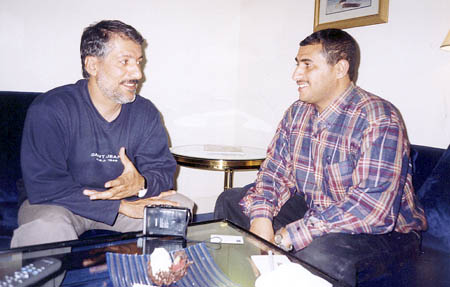Islah & the Glory of Victory [Archives:2001/09/Law & Diplomacy]
By Jalal Al-Shara’abi
Despite what is being said about Islamists and fundamentalists in Yemen before 1990 and their relationship with the investigative bureaus of the Police Security Office (PSO), and regardless of their viewpoints regarding social and political issues, Islah has proved itself worthy of respect for its role in the local council elections.
If we remember the trio-coalitions of the GPC, YSP and Islah we will see how Islah surprised everyone by evolving as a strong party to form a coalition that could run the government from 1993 to 1997. However, after disappointment in the 1997 elections, Islah was left marginalized, making many analysts think that the GPC strategy of marginalization and weakening would be effective to weaken Islah further. But Islah surprised us all once again by rising to the occasion in the country’s first local council elections.
The only point of weakness that was raised by opposition parties is that Islah was no more than the other side of the coin, and its strong alliance with the GPC during the presidential elections was their supporting theory. But the alliance with the GPC, as Islah members rightfully say, was a key to their success in the local elections. Islah made sure that its strategic partnership with GPC would turn eyes away from its activities on the streets. Islah was not idle during these years of partnership. It was active on the public level through its community sessions and social activities.
Having Islah challenge the GPC, which controls the media, the army, and the public funds is not an easy task, and its role should be respected as it is the only party that was willing to compete against the ruling party with all its might. All observers expected less of a competition between the GPC and Islah, and the results astonished many political analysts, who realized that Islah was implementing a long-term plan to get a good share of the local council seats.
Islah is distinguished among all the opposition parties in that it worked day and night to prepare communities and societies for the elections on different levels. The other opposition parties failed to do the same, and hence it resulted in their failure to get the number of seats for any possible competition in the future.
Even though the opposition parties other than Islah were right when they said that the local council elections became a mockery and a drawback in democracy because of the extreme violations and armed confrontations, which were too high a price to pay. But it is also true that even without these violations, the opposition were not to find a good share in the elections due to their incomplete readiness for the elections.
A good example of the fact that opposition parties other than Islah lack a strong base to win votes and gain public support is that until this very moment, most of them don’t own their headquarters and their newspaper’s offices are still based on monthly rent. Hence, the opposition was not able to confront the media campaign or fight against the fraud or legal violations of the electoral process. All it was able to do was complain and blame the ruling party for all the mess, and that is it!
Here once again, rises the Islah Party with the ability to confront the ruling party and put a full stop to its total domination and with a spirit of resistance, openly challenged the GPC during the electoral process. Most important of all, Islah had reminded us that there is a way to break the domination of a certain party in power. With hard work, long-term planning, resistance, and with a spirit of challenge, everything is possible. Even though the GPC was not able to accept the shock of failure in many electoral centers, and even if the GPC holds elections again and wins these centers, the fact is that Islah has risen to the occasion and shaken the GPC.
I personally believe that any success for Islah is a success for democracy at this particular time, not because it is Islah, but because it is the party that broke the GPC domination, and once again established a reasonable balance of political power.
Islah seemed to have faced all sorts of fraud and violations in support of the GPC in many electoral areas as many eyewitnesses confirmed. Yet, it did not give up, and continued its fight for its right, and for all the hard work it exerted for so long.
Several Islamic parties in the Arab world presented sad experiences that led to the violent diminishing of their parties. Their Islamic movements that were once successful and popular among the public were later crushed by the governments of their respected countries, mostly by orders of the west, which cannot accept an Islamic government taking over power.
Islah presented an example different from many other Islamic parties. It used strategy, vision, and long-term planning to reach its goals. It did not openly state its views in a way that could give an excuse to the government to shut it down or crush it, as many other parties did in the past. Its tactics and strategies were the main reason for its success in the latest elections.
The heated armed confrontations, which were taking place as I was writing this article, lead to something of a drawback in the democratic process, especially concerning the constitutional amendments. But if there is only one positive reflection of the elections, then it would be the reminder that there is always a possibility to maintain a balance of political power, in a peaceful manner. That is what Islah demonstrated, and that is what other opposition parties should learn from.
——
[archive-e:09-v:2001-y:2001-d:2001-02-26-p:./2001/iss09/l&d.htm]


